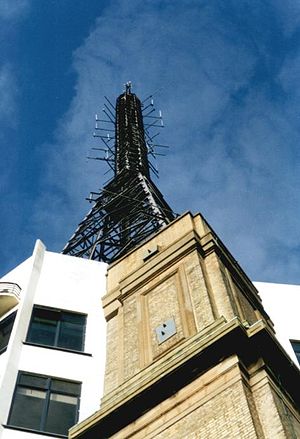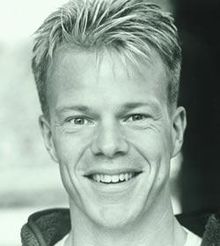Portal:BBC
The BBC Portal
The British Broadcasting Corporation (BBC) is a British public service broadcaster headquartered at Broadcasting House in London, England. Originally established in 1922 as the British Broadcasting Company, it evolved into its current state with its current name on New Year's Day 1927. The oldest and largest local and global broadcaster by stature and by number of employees, the BBC employs over 21,000 staff in total, of whom approximately 17,900 are in public-sector broadcasting.
The BBC was established under a royal charter, and operates under an agreement with the Secretary of State for Culture, Media and Sport. Its work is funded principally by an annual television licence fee which is charged to all British households, companies, and organisations using any type of equipment to receive or record live television broadcasts or to use the BBC's streaming service, iPlayer. The fee is set by the British Government, agreed by Parliament, and is used to fund the BBC's radio, TV, and online services covering the nations and regions of the UK. Since 1 April 2014, it has also funded the BBC World Service (launched in 1932 as the BBC Empire Service), which broadcasts in 28 languages and provides comprehensive TV, radio, and online services in Arabic and Persian.
Some of the BBC's revenue comes from its commercial subsidiary BBC Studios (formerly BBC Worldwide), which sells BBC programmes and services internationally and also distributes the BBC's international 24-hour English-language news services BBC News, and from BBC.com, provided by BBC Global News Ltd. In 2009, the company was awarded the Queen's Award for Enterprise in recognition of its international achievements in business. (Full article...)
Selected article
From October 1988 to September 1994 the British government banned broadcasts of the voices of representatives from Sinn Féin and several Irish republican and loyalist groups on television and radio in the United Kingdom (UK). The restrictions, announced by the Home Secretary, Douglas Hurd, on 19 October 1988, covered eleven organisations based in Northern Ireland. The ban followed a heightened period of violence in the course of the Troubles (1960s to 1990s), and reflected the UK government's belief in a need to prevent Sinn Féin from using the media for political advantage.
Broadcasters quickly found ways around the ban, chiefly by using actors to dub the voices of banned speakers. The legislation did not apply during election campaigns and under certain other circumstances. The restrictions caused difficulties for British journalists who spoke out against censorship imposed by various other countries, such as by Iraq and India. Ireland had its own similar legislation that banned anyone with links to paramilitary groups from the airwaves, but this restriction lapsed in January 1994. This increased pressure on the British government to abandon its policy; John Major lifted the broadcast ban on 16 September 1994, a fortnight after the first Provisional Irish Republican Army ceasefire (declared on 31 August 1994). (Full article...)Selected image

Nicholas Parsons during a recording of BBC Radio 4's Just a Minute. First aired in 1967, the comedy panel game was chaired by Parsons for over 50 years and it won a Gold Sony Radio Academy Award in 2003.
Selected list article
The BBC Sports Personality of the Year Helen Rollason Award is an award given annually as part of the BBC Sports Personality of the Year ceremony each December. The award is given “for outstanding achievement in the face of adversity”, and BBC Sport selects the winner. The award is named after the BBC sports presenter Helen Rollason, who died in August 1999 at the age of 43 after suffering from cancer for two years. Helen Rollason was the first female presenter of Grandstand. After being diagnosed with cancer, she helped raise over £5 million to set up a cancer wing at the North Middlesex Hospital, where she received most of her treatment.
The inaugural recipient of the award was horse trainer Jenny Pitman, in 1999. Other winners include South African Paralympic sprinter Oscar Pistorius, who won the award in 2007. Several recipients have not played a sport professionally, including Jane Tomlinson, who won in 2002, Kirsty Howard (2004), Phil Packer (2009), Anne Williams, who received the award posthumously in 2013, and eight-year-old Bailey Matthews (2015). Michael Watson, who won the award in 2003, had a career in boxing but was paralysed and almost killed in a title bout with Chris Eubank. He won the award for completing the London Marathon, an accomplishment that took him six days. Former footballer Geoff Thomas won the award in 2005; he raised money by cycling the 2,200 miles (3,540.56 km) of the 2005 Tour de France course in the same number of days as the professionals completed it. In 2006, Paul Hunter posthumously received the award; he died from dozens of malignant neuroendocrine tumours – his widow Lindsay accepted the award on his behalf. (Full article...)List of selected list articles
|
|---|
Related portals
Selected biography
Mark Warwick Fordham Speight (6 August 1965 – 7 April 2008) was an English television presenter and host of children's art programme SMart. Speight was born in Seisdon, Staffordshire, and left school at 16 to become a cartoonist. He took a degree in commercial and graphic art and, while working in television set construction, heard of auditions for a new children's art programme. Speight was successful in his audition and became one of the first presenters of SMart, working on it for 14 years.
Speight was also a presenter on See It Saw It, where he met his future fiancée, actress and model Natasha Collins. He took part in live events, such as Rolf on Art and his own Speight of the Art workshops for children. He was involved in charity work; he became the president of the Muscular Dystrophy Campaign's Young Pavement Artists Competition, and was a spokesperson for ChildLine. (Full article...)Selected building

The transmission mast above the BBC wing of Alexandra Palace in North London. Alexandra Palace was home to the BBC Television Service (now BBC One) from 1936 until the early 1950s, and was the site of the world's first public broadcasts of analogue high-definition television in 1936.
Did you know
Highlights from Wikipedia's Did you know

- ... that author Jacqueline Wilson described Dustbin Baby, the BBC dramatisation of her novel of the same name, as the best ever film adaptation of her work?
- ... that the episodes of the BBC 7 sitcom Knocker have titles such as "Privinvasionacy", "Obselejectivitysence" and "Confidentialitydence"?
- ... that BBC traffic reporter Sally Traffic has also narrated poetry albums for the blind?
- ... that the BBC journalist Barbara Plett's admission of having cried at the sight of the terminally ill Yasser Arafat led to a controversy?
- ... that in May 2015 BBC Four aired "the most boring TV show ever" – an un-narrated, two-hour narrowboat journey on the Kennet and Avon Canal?
- ... that after being wiped by the BBC, all four episodes of the Doctor Who serial The Time Meddler were discovered in Nigeria in 1984?
- ... that the programming language Acorn System BASIC was so non-standard that one commenter suggested that using it on the BBC Micro would be a disaster?
- ... that South African physician Tlaleng Mofokeng is the United Nations special rapporteur on the right to health, and was named one of the BBC's 100 Women?
- ... that BBC Breakfast's resident doctor Nighat Arif has advocated for more women to be given vibrators for medical reasons?
BBC topics
Categories
WikiProjects

This portal is maintained by members of WikiProject BBC, in particular those listed on the Portal Maintenance page.
To join the project, please add your username to the list of members.
| WikiProject BBC Navigation |
|---|
| Main page | WikiProject talk | Assessment | Requests | Templates BBC Portal (Maintenance) | Radio task force | Sitcoms task force |
Associated Wikimedia
The following Wikimedia Foundation sister projects provide more on this subject:
-
Commons
Free media repository -
Wikibooks
Free textbooks and manuals -
Wikidata
Free knowledge base -
Wikinews
Free-content news -
Wikiquote
Collection of quotations -
Wikisource
Free-content library -
Wikiversity
Free learning tools -
Wiktionary
Dictionary and thesaurus
























